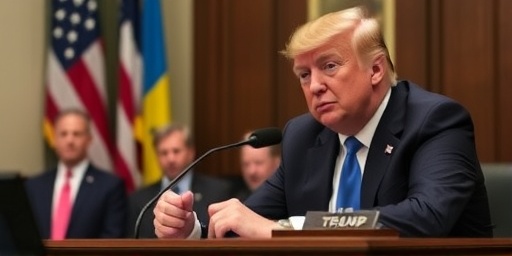In a bold legislative move that’s shaking up Washington, members of the bipartisan Ukraine Caucus in the US House of Representatives are invoking a rarely used procedural tool to compel a floor vote on sweeping new Russia sanctions, even as President Donald Trump accelerates his push for a Ukraine peace deal that critics decry as too lenient on Moscow. This clash highlights deepening rifts within Congress over America’s stance on the ongoing Ukraine conflict, with lawmakers from both parties expressing alarm that the administration’s diplomatic overtures could undermine efforts to hold Russia accountable for its 2022 invasion.
- Ukraine Caucus Leverages Discharge Petition to Bypass Leadership
- Trump’s Ukraine Peace Deal Draws Fire from Allies and Adversaries Alike
- Bipartisan Concerns Escalate Over Administration’s Russia Reset
- Historical Echoes and Lessons from Past US-Russia Sanctions Battles
- Path Forward: Will Sanctions Vote Reshape US-Ukraine Policy?
Ukraine Caucus Leverages Discharge Petition to Bypass Leadership
The Ukraine Caucus, a cross-party group comprising over 100 House members dedicated to supporting Kyiv’s defense against Russian aggression, announced on Tuesday their intent to file a discharge petition against a stalled bill imposing tougher penalties on Russia’s energy sector and oligarchs. This procedural maneuver, which requires 218 signatures to force a vote, sidesteps House Speaker Mike Johnson’s reluctance to bring the measure to the floor amid GOP divisions. “We’re not waiting for permission to do what’s right for Ukraine and global security,” said Rep. Brian Fitzpatrick (R-Pa.), co-chair of the caucus, in a statement released to reporters. Fitzpatrick, a moderate Republican, emphasized that the petition already has commitments from more than 150 members, including Democrats like Rep. Gregory Meeks (D-N.Y.) and a growing number of conservatives wary of Trump’s foreign policy resets.
The sanctions package, formally known as H.R. 4567, targets Russia’s circumvention of existing penalties through third-party nations like China and India. It includes provisions to seize frozen Russian assets—estimated at over $300 billion globally—and redirect them toward Ukraine’s reconstruction. According to a recent report from the Atlantic Council, such measures could cripple Moscow’s war machine by limiting its access to Western technology and financial systems. The bill’s momentum builds on last year’s bipartisan success in passing aid to Ukraine, but this time, the caucus faces steeper odds in a narrowly divided House where isolationist voices, emboldened by Trump’s influence, are gaining traction.
Supporters argue that the timing is critical. With Russian forces reportedly advancing in eastern Ukraine, capturing villages near Kharkiv in recent weeks, the need for economic pressure on the Kremlin has never been more urgent. “Every day we delay, Putin gets bolder,” Meeks told The Washington Post in an exclusive interview. The discharge petition, last successfully used in 2021 for gun control legislation, represents a rare show of congressional independence from executive branch priorities.
Trump’s Ukraine Peace Deal Draws Fire from Allies and Adversaries Alike
At the heart of the congressional pushback is President Trump’s ambitious yet polarizing Ukraine peace deal, unveiled during a White House briefing last month. The proposal calls for an immediate ceasefire, neutral status for Ukraine, and direct US-Russia negotiations—elements that echo Moscow’s demands but fall short of Kyiv’s insistence on full territorial restoration. Trump, who has repeatedly touted his deal-making prowess, claimed the framework could end the war “in 24 hours” by leveraging economic incentives for Russia and security guarantees for Ukraine. However, details remain vague, with the administration citing ongoing classified talks.
Critics in Congress, including Senate Majority Leader Chuck Schumer (D-N.Y.), have labeled the plan a “surrender to aggression.” Schumer took to the Senate floor on Monday, warning that conceding Crimea—illegally annexed by Russia in 2014—would embolden authoritarian regimes worldwide. “This isn’t peace; it’s appeasement,” Schumer declared, invoking historical parallels to the Munich Agreement of 1938. Bipartisan concerns extend to the Republican side, where Sen. Lindsey Graham (R-S.C.) has voiced private reservations, telling aides that the deal risks alienating NATO allies like Poland and the Baltics.
The peace deal’s rollout coincides with Trump’s broader foreign policy pivot, including a summit with Russian President Vladimir Putin scheduled for next month in Geneva. Administration officials, speaking anonymously, insist the initiative aligns with Trump’s “America First” doctrine by reducing US entanglement in European conflicts and focusing resources on domestic issues like border security. Yet, a Pew Research Center poll released this week shows 62% of Americans oppose any deal that doesn’t include Ukraine’s NATO aspirations, underscoring public skepticism. European leaders, from UK Prime Minister Keir Starmer to German Chancellor Olaf Scholz, have expressed unease, with the EU Parliament passing a non-binding resolution urging the US to maintain sanctions pressure.
Bipartisan Concerns Escalate Over Administration’s Russia Reset
The Ukraine Caucus’s actions reflect a broader bipartisan frustration with the Trump administration’s approach to Russia, which some lawmakers describe as a dangerous thaw in relations. Since taking office, Trump has moved to pause certain sanctions enforcement, citing humanitarian concerns over Russia’s economy, and has floated lifting restrictions on Nord Stream 2 pipeline operations—moves that could boost Moscow’s gas exports to Europe. “Congress must reassert its constitutional role in foreign policy,” argued Rep. Elissa Slotkin (D-Mich.), a former CIA analyst and caucus member, during a Capitol Hill press conference.
Slotkin’s comments were echoed by Rep. Mike Gallagher (R-Wis.), who chairs the House Select Committee on the Chinese Communist Party but has been vocal on Russia-Ukraine issues. Gallagher highlighted intelligence reports suggesting Russian operatives are exploiting the diplomatic window to rebuild military stockpiles, with drone production up 40% since the invasion began, per Pentagon estimates. The caucus has also pointed to Russia’s hybrid warfare tactics, including cyberattacks on US infrastructure and disinformation campaigns targeting the 2024 elections.
To bolster their case, advocates are weaving in economic arguments. The sanctions bill could generate up to $50 billion in revenue from seized assets, according to Treasury Department projections, funds that could offset US aid to Ukraine—now totaling $175 billion since 2022. Critics of the peace deal worry it would forfeit these levers, potentially costing American jobs in the defense sector. A coalition of business leaders, including CEOs from Boeing and Raytheon, submitted a letter to Congress last week supporting the sanctions, noting that prolonged conflict stability benefits global markets.
Internationally, the maneuver has ripple effects. Ukrainian President Volodymyr Zelenskyy praised the caucus in a virtual address to lawmakers, stating, “Your resolve strengthens our fight for freedom.” Meanwhile, Russian Foreign Minister Sergey Lavrov dismissed the effort as “Russophobic hysteria,” vowing retaliation if new penalties pass.
Historical Echoes and Lessons from Past US-Russia Sanctions Battles
This latest congressional standoff isn’t occurring in a vacuum; it draws from a decade of escalating US-Russia tensions. Sanctions first ramped up after Russia’s 2014 annexation of Crimea, with the Countering America’s Adversaries Through Sanctions Act (CAATSA) under Trump himself in 2017—ironically, a law the current president has sought to amend. That legislation targeted Russian election interference and human rights abuses, freezing assets of figures like oligarch Oleg Deripaska. Yet, enforcement has been inconsistent; a Government Accountability Office audit last year found that only 60% of mandated penalties were implemented due to diplomatic exemptions.
The Ukraine war has supercharged these efforts. Post-2022 invasion, Congress passed multiple packages, including the REPO Act, which unlocked $100 billion in immobilized Russian central bank reserves. Statistics from the Kiel Institute for the World Economy indicate that sanctions have slashed Russia’s GDP by 2.1% annually and reduced its oil revenues by 30%, though black-market adaptations via shadow fleets have blunted some impacts. The Ukraine Caucus is pushing for innovations like secondary sanctions on enablers in Turkey and the UAE, aiming to close these loopholes.
Looking back, similar discharge petitions have succeeded in high-stakes foreign policy fights, such as the 1980s battles over South Africa apartheid sanctions. Rep. Ann Wagner (R-Mo.), a caucus vice-chair, invoked this history in a Politico op-ed, writing, “Just as we isolated Pretoria then, we must isolate Putin now to force a just peace.” The current effort also intersects with domestic politics; with midterms looming, pro-Ukraine stances could mobilize suburban voters, while Trump’s base favors de-escalation to cut foreign spending.
Challenges persist, however. House Republicans, holding a slim majority, face internal fractures—ultra-conservatives like Rep. Matt Gaetz (R-Fla.) have derided Ukraine aid as a “money pit,” aligning with Trump’s narrative. Democrats, meanwhile, must navigate progressive calls for broader peace diplomacy. A compromise could emerge blending sanctions with peace incentives, but caucus leaders insist on teeth in any deal.
Path Forward: Will Sanctions Vote Reshape US-Ukraine Policy?
As the discharge petition gains signatures, the coming weeks could redefine US policy toward Ukraine and Russia. If successful, the vote—potentially as early as next month—would test the House’s will against White House pressure, possibly leading to a veto showdown. Trump has threatened to block similar bills, calling them obstacles to his “grand bargain.” Yet, with Senate backing likely from figures like Sen. Marco Rubio (R-Fla.), who supports targeted sanctions, override prospects brighten.
Broader implications loom large. A strengthened sanctions regime could deter Russian advances, bolstering Ukraine’s summer counteroffensive plans and reassuring NATO partners ahead of the July summit in Vilnius. Economically, it might stabilize global energy prices, which spiked 15% last quarter amid war uncertainties. For Trump, failure to corral Congress risks portraying his administration as weak on national security, potentially fueling 2026 election debates.
Advocates like Fitzpatrick remain optimistic, predicting the petition’s passage will signal to Moscow that peace must come on democratic terms, not conquest. As Zelenskyy prepares for his next US visit, the caucus’s gambit underscores Congress’s pivotal role in a conflict that’s not just Ukraine’s fight, but a test of the post-Cold War order. Stakeholders from Kyiv to the Kremlin are watching closely, knowing the vote’s outcome could tip the scales toward resolution or renewed escalation.








